5 Determined Private Equity Firms Have Their Eyeball on Logistic Startups
During the COVID-19 epidemic, the focus of the world’s attention appeared to move to supply chains and logistics. Supply-chain resilience was made important by the rapid growth of e-commerce, which increased by over 25%, as well as capacity issues and traffic jams in both air and maritime transportation. The importance of logistics and the need for enhanced supply chain visibility appear to be receiving increasing attention.
Funding for logistics companies grew significantly as a result. Startup finance in logistics: New money for an old industry? was the title of a May 2020 McKinsey report that looked at funding trends in the transportation and logistics industry. Since then, financing has increased for logistics startups nearly twofold in 2021 compared to 2020, but it has also changed to focus on other logistics subsectors.
Funding for logistics companies roughly doubled in 2022 compared to 2020. However, financing trends have also changed in favor of different logistics subsectors. More businesses may develop into recognized disruptors in their particular markets. Many are creating a worldwide footprint akin to major players.
It is quite unlikely that there will be significant competition with existing incumbents in the near future that offer a global end-to-end solution. However, in some places and regions, the competition for new businesses is increasing. Additionally, incumbents will likely increase the scope of their digital offerings in reaction to the maturing of startups.
It’s important to consider our ranking of the top 5 private equity firms if you’re looking for a mutually beneficial partnership.
#1: Tower Arch Capital – The “Grandiose Rock” in Utah
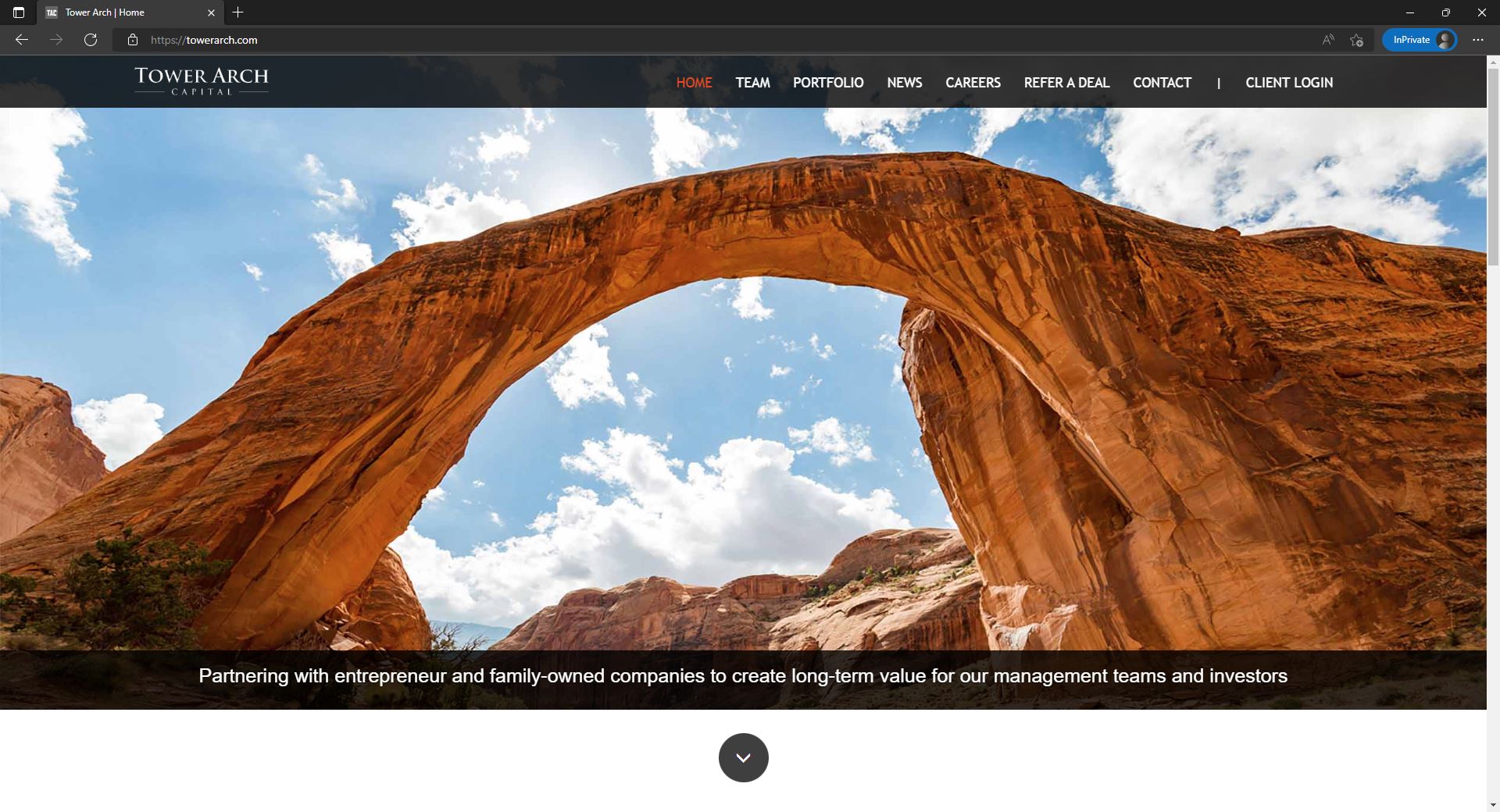
Tower Arch Capital is a lower-middle market private equity firm with over $700 million in assets under management. The partners at Tower Arch have experience in senior executive roles and consulting for Fortune 500 companies on a variety of topics, from strategic planning to operational enhancements. The partners invested in and collaborated with many family- and entrepreneur-owned firms before starting the firm to assist them add value. Many of these business founders and entrepreneurs are currently Tower Arch investors.
Tower Arch seeks to partner with strong management teams and entrepreneurs to provide them with significant liquidity while still maintaining ownership in their business. Additionally, the firm will work with CEOs to design equity ownership packages for key management team members to align incentives and allow them to participate in the value they help create.
Tower Arch enables management teams to continue to do what they do best: managing and operating their business. At the same time, their investment professionals have extensive operating, consulting, and financing experience, which allow them to act as a value-added resource to their management teams as they evaluate new opportunities and handle the issues faced by growing companies.
The businesses closely engage with businesses to aid in their geographic expansion, product diversification, distribution channel development, and acquisition of complementary companies. Additionally, Tower Arch Capital assists businesses with performing thorough analyses of the profitability and cost-drivers of their product lines, maximizing new credit lines to support expansion, and hiring more management expertise.
Tower Arch seeks to invest in companies with the following characteristics: Passionate management teams; Proven business models with recurring revenues; Defensible market positions; Growing end-market demand for the products or services; Historical growth in revenue and profitability; Ability to generate high returns on invested capital
Tower Arch makes investments in businesses around the country that have an annual sales range of $20 to $150 million or an EBITDA range of $5 to $25 million. The capital’s investment team has experience designing transactions to satisfy the various demands of management groups and business owners. The target investments include recapitalizations, management-led buyouts, and corporate divestitures.
#2: HCI Equity Partners – A “Big Guy” with Solid Core Values
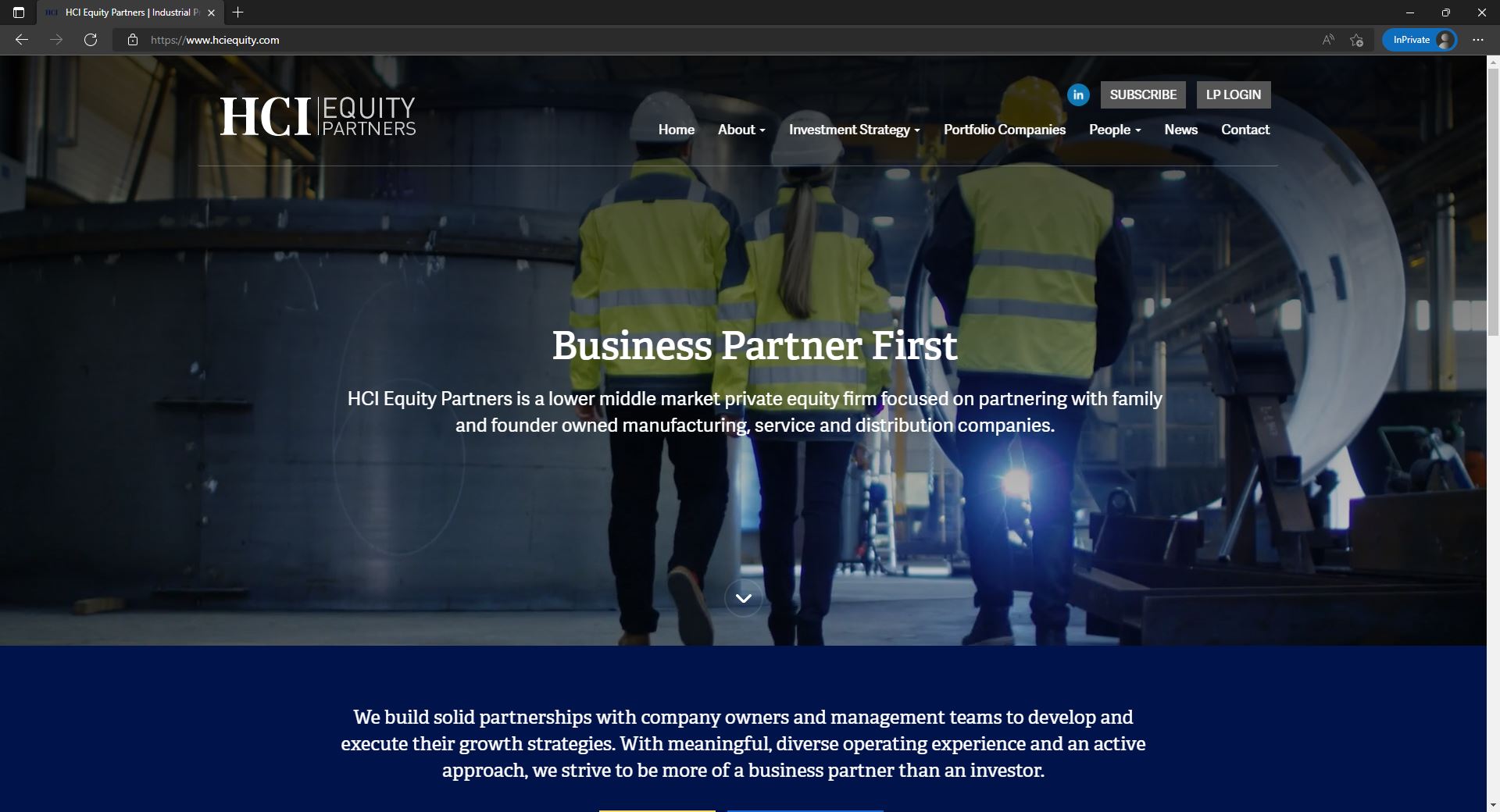
HCI Equity Partners is a lower middle market private equity firm focused on partnering with family and founder owned manufacturing, service and distribution companies. The company creates strong working relationships with management teams and business owners to help them create and carry out their growth objectives. The organization seeks to be more of a business partner than an investor by utilizing significant, broad operating experience and an active approach.
The company collaborates with management groups to promote value development and growth. The bulk of the top team members have held the positions of CEO, President, or CFO throughout their careers, setting them apart from other financial partners with their distinctive and complementary blend of operating and investing experience. This drives a deeper understanding of sector trends and business fundamentals. They help in the creation and support of clearly defined acquisition and organic growth strategies as well as operational improvements. They work with management groups that are committed to achievement, professionalism, and honesty.
HCI Equity Partners has a strong experience of establishing fruitful alliances with growth-oriented North American manufacturing, service, and distribution businesses. HCI focuses on the lower middle market, which consists of businesses with yearly revenues ranging from $20 to $200 million. HCI believes that its extensive operating experience provides a deeper understanding of industry sector trends and business fundamentals. What distinguishes them from other private equity firms is this experience mixed with strong culture.
HCI Equity Partners accepts investments in family/founder owned businesses covering the spectrum of manufacturing, service, and distribution enterprises with a solid management team and an appealing business plan. In order to align interests and create a common vision for growth, they prefer partnerships with owners and management teams who demand significant equity shares.
#3: Enlightenment Capital – A “Flaming Spark” in Chevy Chase
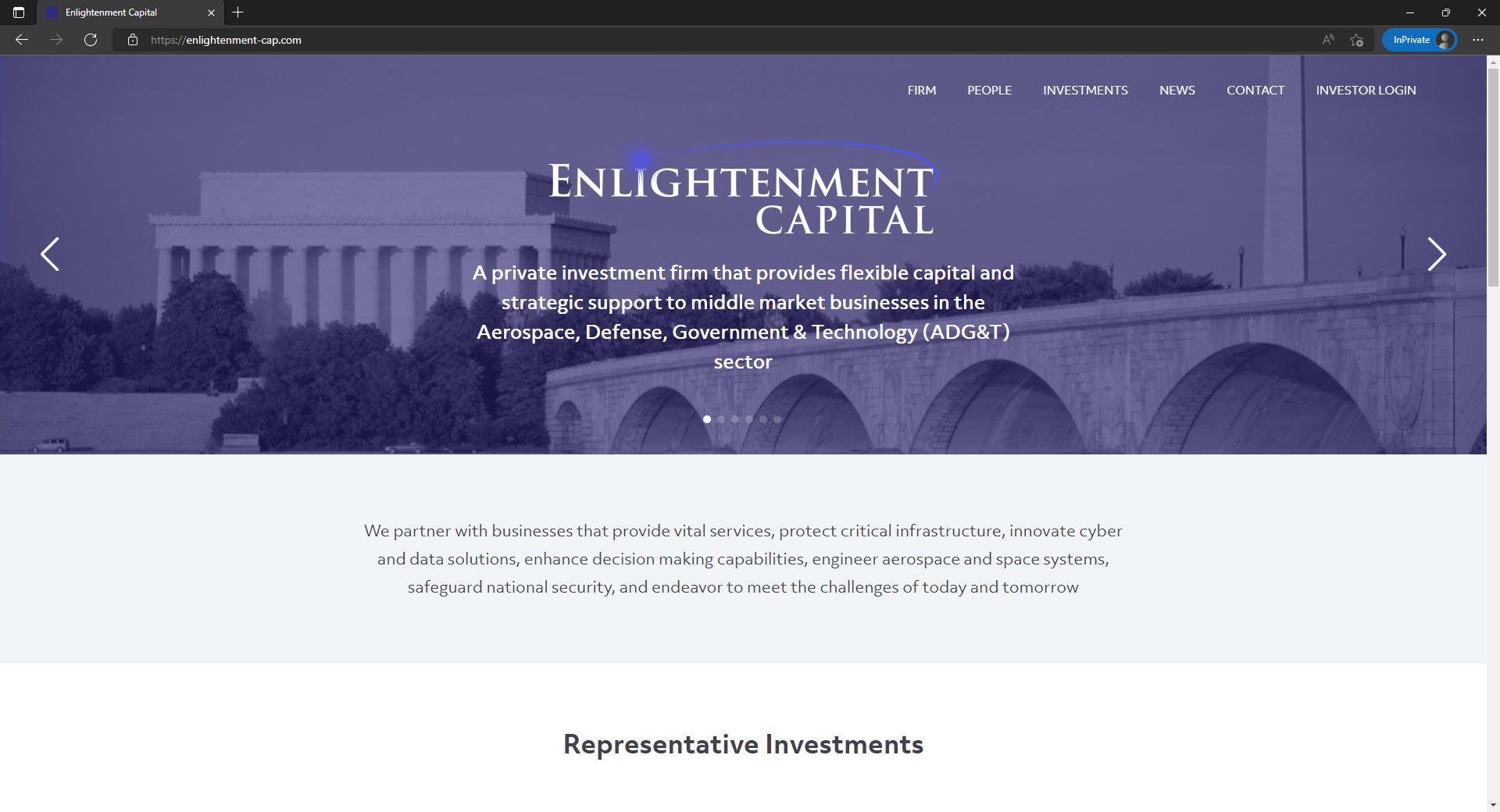
Enlightenment Capital is a private investment company that offers middle market companies in the Aerospace, Defense, Government, and Technology (ADG&T) industry flexible capital options and strategic support. The company makes investments in senior debt, mezzanine debt, and equity (minority and control).
The Enlightenment team has dedicated their entire professional lives to funding and assisting the ADG&T industry. The company places a high value on collaborating with elite management groups committed to creating high-caliber businesses that are industry leaders. Enlightenment Capital assists firms that provide mission-critical support to national security and government operations with strategic help around organic and inorganic development initiatives and innovative capital solutions as the market reorients and changes.
The company has strong ties to the ADG&T sector and the investing community, as well as knowledge of the innovations, regulations, and dynamics influencing the sector’s development. These are the forces that Enlightenment Capital uses to find attractive investment opportunities and long-lasting relationships.
The company seeks to collaborate with companies that deliver essential services, defend critical infrastructure, develop cutting-edge cyber and data solutions, improve decision-making skills, design aerospace and space systems, protect national security, and work to overcome challenges of the present and the future.
The fund has a handful of portfolio startup founders as particular favorites. They might highlight 0glass, Alauda, and Aurora Flight Sciences among the fund’s several public portfolio startups. Additionally, a startup must be between 11 and 15 years old to qualify for the fund’s investment.
The fund typically makes investments in rounds with 1-2 participants. Startups are frequently funded by Gaorong Capital, CBC Capital, and Westbury Partners despite Enlightenment Capital. Ming Capital, Jun Capital, and Intel Capital are significant sponsors for the fund’s investment in the same round. Yungpark Lingzhong Fund, Qingyan New Generation Artificial Intelligence Fund, and District-10 VRAR Incubator Fund are typically the sources of funding for subsequent rounds.
#4: WestView Capital Partners – A “Lighthouse” for Growth-oriented Companies
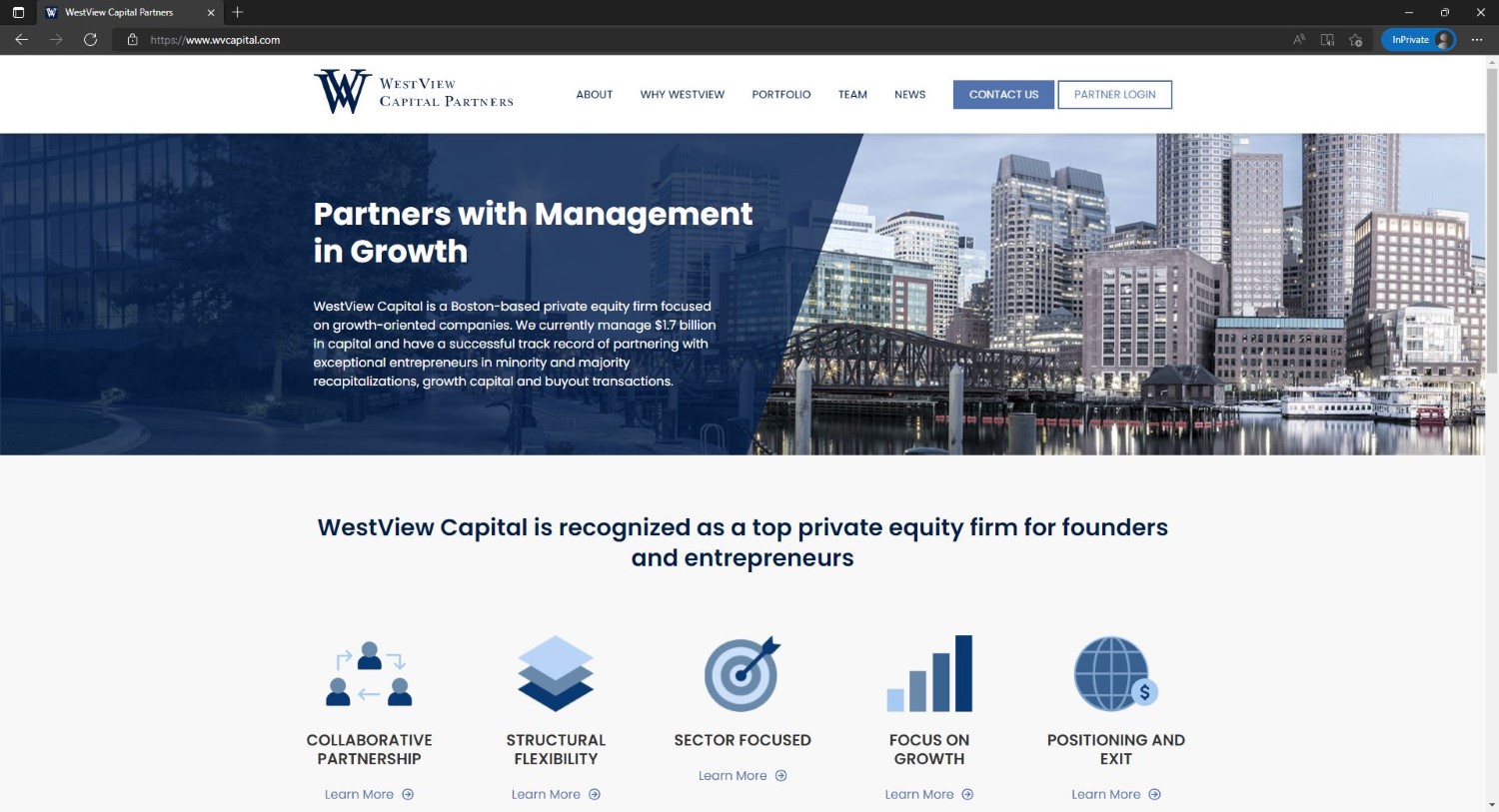
WestView Capital Partners was founded in 2004 by Carlo von Schroeter and Rick Williams to pursue their entrepreneurial desire to build a differentiated private equity firm. They pursued a common vision focused on working with exceptional founders and entrepreneurs to help them build their firms through technology, creativity, opportunism, hard work, and grit. They had both been active growth equity investors at larger organizations since 1990.
WestView Capital is a Boston-based private equity firm focused on growth-oriented companies. Their current capital under management is $1.7 billion, and they have a proven track record of working with extraordinary entrepreneurs in minority and majority recapitalizations, growth capital, and buyout transactions.
In order to assist exceptional management teams in achieving the strategic, financial, and operational goals of their companies, WestView Capital Partners provides equity capital. They treat their partnerships and long-term connections with honesty, integrity, and a greater respect for their management team partners.
Acting as advisors to, and partners with, management, the depth and breadth of their experience has given them a solid understanding and appreciation for the financial, strategic and operational issues that confront the leadership of middle market companies.
They are engaged partners that are dedicated to utilizing their extensive industry knowledge, significant financial resources, solid networks in our target industry sectors, and strategic insights to support management in creating a profitable business. Particularly, as they engage with management to help businesses through mergers, acquisitions, and financings, their knowledge, strategic ties, and credibility in the financial sector give organizations greater access to capital.
The firm seeks to invest $15 to $60 million of equity in companies with exceptional managers. They are prepared and able to arrange bigger investments with the assistance of our limited partners and other investors.
They concentrate on businesses that meet the following requirements: consistent and rising past financial performance; sales of at least $10 million; EBITDA of between $3 and $25 million; and long-lasting competitive advantages and market position.
Although the company prefers to be the lead equity investor, co-investing with individuals that share their investment philosophy and partnership investing strategy is always an option. They take pleasure in having a unique, control-neutral strategy and are equally at ease investing as a minority or significant shareholder. What matters most to them is that their management teams are meaningful owners.
#5: Pfingsten Partners – A “strategist” in Chicago
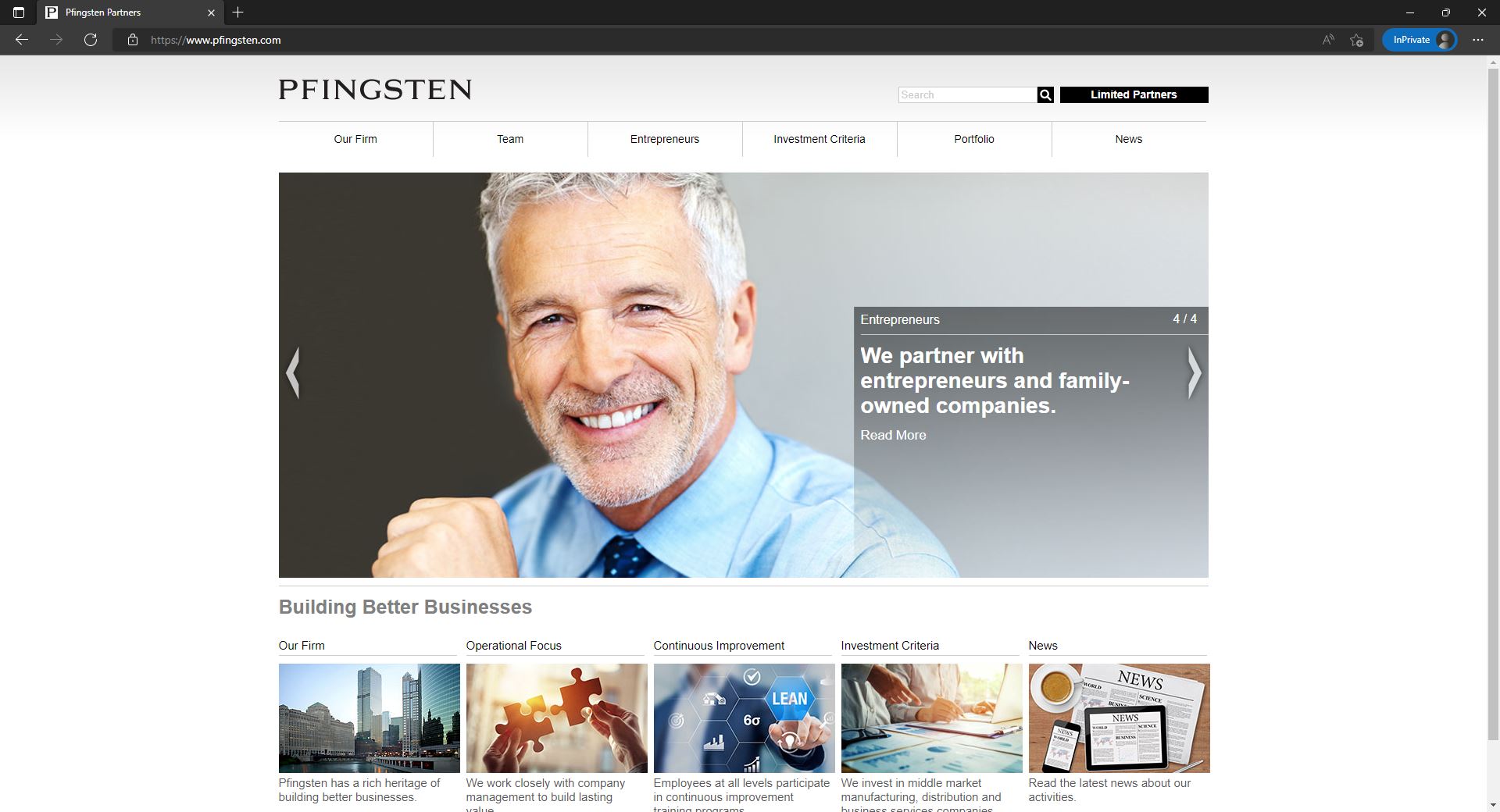
Pfingsten is a private equity firm with an operational focus that was established in 1989 with the goal of creating better companies. By utilizing special operational and international resources to provide practical solutions to unlock value and spur growth, they engage with entrepreneurs and management teams to help them build better firms from their headquarters in Chicago and their representative offices in China and India.
Each portfolio company receives a minimum investment of 50% stock from the firm, giving it the freedom to add value through operational enhancements, expert management techniques, global reach, and successful business expansion.
Throughout our history, they have contributed, on average, 65% equity to the capital structure of each platform company, allowing management teams to concentrate on one task: improving the company.
Their conservative capital structures also increase the ability to close transactions. Over 50% equity in a company’s capital structure closes deals, even in erratic credit markets. Because they do not employ mezzanine debt, subordinated debt, or second lien financing, negotiations are streamlined and made easier. They have successfully completed about 90% of signed letters of intent, and they have never seen a financing-related deal failure.
Pfingsten is a committed value-added partner. They offer management teams operating resources and worldwide competencies in addition to equity funding, enabling them to locate and hasten growth initiatives. The companies are conservatively capitalized to give management the freedom to make the necessary investments in people, systems, infrastructure, and machinery.
Their platform companies’ financial structures are made to give management the flexibility to withstand market fluctuations and competitive challenges as well as to sustain significant investments in personnel, infrastructure, equipment, and add-on strategic acquisitions. Throughout its more than thirty-year history, Pfingsten has never had a single business declared bankruptcy.
The company invests in businesses that fit the following criteria and operate in fragmented industries: $3 to $12 million in EBITDA, $20 to $150 million in revenue, and $15 to $100 million in transaction value.
Bottom Lines
In the age of digitization, logistics is crucial to optimizing supply chain operations and improving customer satisfaction. Businesses are aware of the significance of logistics management since it plays a crucial role in deciding how things are purchased, stored, and delivered to the end customer. That is the reason why logistics companies have become popular targets in an evolving landscape as supply chains experience escalating timetable, technological, and talent pressures.









